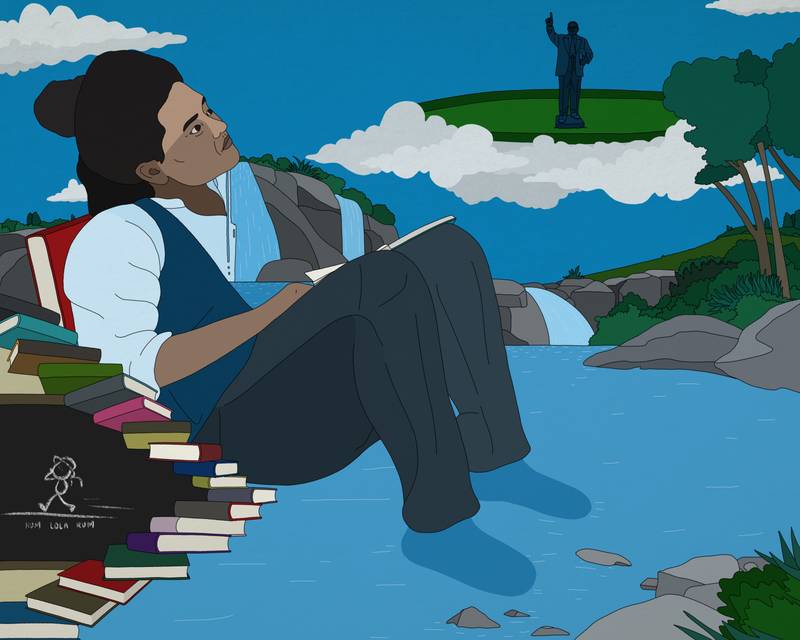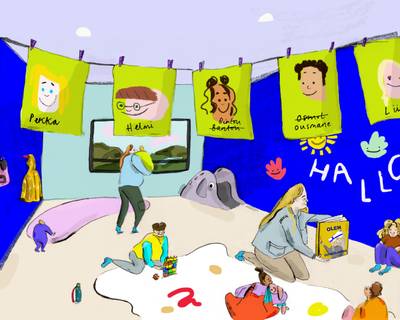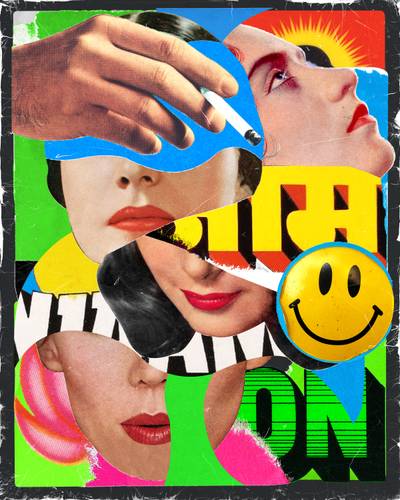

Illustration by Bakery Prasad (Siddhesh Gautam), 2023
Vijeta Kumar teaches Communicative English at St. Joseph’s University, Bengaluru. She has written for The Third Eye, Deccan Herald, India Today, HuffPost, and First Post but is forever rooting for rumlolarum.com, where she writes more regularly. At the moment, she is trapped between doing a PhD and writing short stories but she is truly happiest when she is doing neither.
Classroom as a playground
Teaching hasn’t been the same since a friend pointed out that the classroom is also a playground. I repeat the words ‘classroom’ and ‘playground’ in my head and am puzzled by the opposing images they throw at each other. To begin with, the question of movement—there isn’t much of that possible in a classroom. There is walking in, walking out, sitting, standing, maybe sometimes jumping, and performing, but everything else outside this is considered loitering, lollygagging, hovering, and indiscipline.
This is not the case with the playground, where even stillness, the opposite of play, is allowed. The playground has informal players, cheerleaders, and umpires who all exchange roles. The classroom has one formal teacher and many formal students, and these roles are non-negotiable. The playground has no bells to signal the beginning or the end – no structure; the classroom has both.
For as long as these differences were stark and impenetrable, I could never see the classroom as anything else. As a student, the classroom was a house of mirrors that showed me my own inadequacies in a magnified way. All the possible versions of a self I met here were just as broken as I was. Ironically, this didn’t change even after I began teaching. The situation may have reversed, but I was still the one who didn’t belong. It continued to be a space that reminded me of how behind I am in life and how much there was to learn before I could consider myself an equal to the students I was teaching.
When I first began teaching, I had no idea what I was doing. There was a huge gap between what the students were looking for in a teacher and me. I stuttered, lost my point, wasn’t very grammar-oriented for an English teacher, and so I resorted to keeping myself open to ridicule just to appear approachable so they could take some solace in the fact that even if I was a terrible teacher, I was still a cool person. Like them, I, too, was stuck on the idea that good teachers, or just teachers, look a certain way, speak a certain way, and are experts at what they teach.
This is why the idea of the classroom as a playground is relieving to hear. Because the openness of the playground ensures that it is not only for experts, it is open to all kinds of people, even those who aren’t very good at it, and especially to those willing to learn. The man who was making me see the classroom differently had himself been among the first to benefit from envisioning the classroom as such. Every time he went to class, something happened. He made the students play with the ideas he was throwing at them. The right to eat beef, polyamory, reservation – each of these conversations were opened up not as debates – even healthy ones, but as ideas that, when seen differently, were full with the promise of freedom. He made them chase this promise of freedom.
The practice of treating the classroom as such requires a deep sense of play, yes and also a fool-proof discipline, which comes from having closely read and understood the rules in both the classroom and the playground.
I am 24 years old. It is lunchtime at college.
I am eating dry chapati with potatoes and reading a short story by Sandra Cisneros called ‘Eleven’. In it, a young girl, newly eleven when the story begins, is made to wear an ugly red sweater by her class teacher. The sweater doesn’t belong to her, but the teacher is convinced that it is the girl’s. The teacher is forcing the girl to wear it because she doesn’t like her.
It’s the girl’s birthday, and she is trying hard not to cry. She thinks about her mother and the birthday cake being baked for her. She thinks hard and long about every other thing going well for her, but eventually, she is brought back to feeling like 3 instead of 11, and this makes her cry.
I’m speedily swallowing my chapati and potatoes to ease the lump that is beginning to burn my throat. I start crying. By now, I had learnt not to rationalize my tears. They had a habit of coming anywhere they wanted to without invitation. I let them be. Colleagues around me offer sympathy from far away, and I am relieved they keep it so. I am perhaps crying a little too much now – for the little girl, the little girl’s mother, and Sandra Cisneros. I am crying because I am so moved by the story that I can’t believe something that delicate could have been written so effortlessly that I could finish reading it in three minutes. The bell rings, and I have to go to class. I have no desire to leave the story, so I take it to the class, and it’s only once I am safely inside the classroom that I stop crying.
I read the story aloud and avoid exhaling as much as possible because I am worried that my having to breathe out air will mean that I will miss out on watching the way the students are receiving the story. I pause when the girl says that after she was able to stop crying, another girl in class suddenly remembers that it’s her sweater. When I had read that line just fifteen minutes ago, I had to hold my breath sharply. It was a moment that had made me believe in the story.
But here, in the classroom, my pause develops another pause, and nothing happens. Then I finish reading the story, and still nothing happens. I dramatize my pause a little more and wait for applause. Not getting any, I settle for any kind of response. I am hoping they liked the story at least secretly. If they have, they don’t show it. If they haven’t, they don’t show that either. I am heartbroken. It’s a story that I was only reading for the second time, and still, its effect wasn’t lost on me.
Something had gone wrong. Maybe I hadn’t read it well; maybe they were tired; maybe this just wasn’t their cup of tea. Either way, what became clear to me that day was that I was much too available for the things I was reading and felt extremely let down by my own inability to make the students care similarly for the text.
Approaching close reading
I didn’t know it then, but that approach to the text is what they call ‘close reading’. In literary criticism, it is the careful and deliberate practice of interpretation. But to be careful doesn’t mean to cry. And a good teacher might have figured out a way to convert what she felt into knowledge. But then, what is so bad about teaching with feelings?
Close reading accesses that part of our minds that we usually turn off while reading. When the load is on understanding, not feeling, some parts of the mind and body are also encouraged to keep themselves and the text out, to be suspicious of it. But in close reading, the body is also learning to pay attention to itself when it responds a certain way to a line, a sentence, or a paragraph. Something that can perhaps only come from leisure and the luxury to sit and have the free time to be available to the text. How many Dalit teachers can afford this?
In many ways, such a rare glimpse into seeing something as inhumane and as unkind as untouchability is the work of close reading. It’s what becomes possible when one resists the language of caste, which ties you down and keeps you occupied with struggle. Breaking it is as much a work of the mind as it is of the body.
Kannada writer and founder-member of the Dalit Sangharsha Samiti, K.B. Siddaiah, through his sustained practice of writing epic poetry, was able to offer the view that untouchability is an “insight into the human mind”. I’ve never heard untouchability described in such a manner, but it opens us to an awareness, a rare exercise into the workings of untouchability. It reveals something about the human who practices this as much as it does about those it is practiced upon. It inverts the gaze on untouchability, reverses the knife, and gets us to take a deeper, more meaningful, and critical look at those who are practicing it.
In many ways, such a rare glimpse into seeing something as inhumane and as unkind as untouchability is the work of close reading. It’s what becomes possible when one resists the language of caste, which ties you down and keeps you occupied with struggle. Breaking it is as much a work of the mind as it is of the body.
What Toni Morrison said about race is true of caste as well, “The function, the very serious function of racism is distraction. It keeps you from doing your work. It keeps you explaining, over and over again, your reason for being.” The distraction referred to here is what allows people to keep you out of places they think you don’t belong. And then you spend all your life showing them that you do belong when, in all that time, you could have done so much more for yourself and for your craft. In the struggle for an anti-caste space, fighting to be able to give time and devotion to your craft doesn’t have to be less significant.
The point here is not to ignore caste like we are taught to ignore wounds. It cannot be ignored. The point here is to see it for what it also sometimes is – a distraction. The awareness of even calling it a distraction comes heavy with the weight of guilt. Even as I type this, I can’t help but see that it takes a great deal of fortune, luxury, and privilege to say this. But I also know that it wouldn’t have been easy for me to say it if Toni Morrison hadn’t already.
What do we do with the guilt of having time?
At work, the gift of being able to feel absorbed in what you are doing, your world, craft, art, and indeed your mistakes – isn’t something that can be done easily or naturally if caste is constantly interrupting you. And because of this, for a long time, the classroom was a battlefield – in what is expected of a teacher who isn’t an expert but is still there, in how vulnerable it can leave both students and teachers.
In the desire to make myself free from having to defend myself and my work every day, I longed to create a relationship with teaching and writing that weren’t only coming from a position of defense or of the pressure of having to prove my worth. I craved to write from joy, love, and madness – not defense. I wondered if it is at all possible.
In the desire to make myself free from having to defend myself and my work every day, I longed to create a relationship with teaching and writing that weren’t only coming from a position of defense or of the pressure of having to prove my worth. I craved to write from joy, love, and madness – not defense. I wondered if it is at all possible.
In 1968, British philosopher Gilbert Ryle introduced the word thick-description which was later developed by American anthropologist Clifford Geertz who took the word into his work in as personal a way as possible, changing the very landscape of anthropology. Thick-description is a method of supplying the reader with as much detailing as possible. A writer practicing thick-description immerses herself in the story/culture she is writing about so much, she goes beyond what is required, beyond the simple organization of facts. The details surrounding the facts are probably treated as importantly as the facts themselves.
In ‘Deep Play’, his seminal essay on the Balinese cockfight, Geertz immerses himself into the context he is writing about, breaking every rule guarded by anthro gods till then. What I see in thick-description is a simple unwritten policy of not taking the job for granted, of carrying out the hard work of thinking and the discipline of a patient, elaborate, almost painfully concentrated approach to writing. The task of doing the work well is at the heart of thick description.
I’d even say that it is unintentionally non brahmanical in how much it doesn’t hold back, encouraging one to give it all, save nothing, empty yourself fully so you can be full again. When I carried thick-description as an approach to teaching in the classroom, more things became possible: the classroom was neither a battlefield nor a playground. It was now a stage and I was the magician.
Closely reading cow-dung slingers
As a practice, immersing oneself in thick description and close reading have the capacity to interrupt caste. The time and energy it takes to apply myself and think about what I am reading swallows me into a world and leaves me suspended there, making me unavailable to people who aren’t comfortable with the idea of a Dalit person engaging in something that is not her humiliation. Reading is a way of being unavailable to a world that has taught you to remain outside. When we encounter stories about what being able to read and write did for people from the margins, we are essentially encountering the impact of close reading.
When Savitribai Phule walked to work, many cow-dung slingers stopped her, mocked her, and tried to prevent her from working by throwing cow dung at her. A student once told me about her aunt, the only Dalit woman to become the principal of her school who, when she tried to enter her office on the first day of her job, found that the locks had been changed by the secretary who refused to work for a Dalit Woman. The sight of Dalit women taking space at work, art, sports, films leaves many with a severe indigestion problem.
But that is one kind of indigestion.
The other kind of indigestion comes from non-Dalit experts on Dalits. Bystanders who believe themselves to be the true revolutionaries. I have often heard them say that modern English-speaking Dalit women have no ground reality because they haven’t suffered enough. Suffering is used as a time-tested measurement to assess the quality of Dalit people’s Dalitness. They don’t think Dalit women should be reading or writing. That’s not revolution. They forget that the man who liberated us could do it because he lost and found himself multiple times in the many voyages he could take by reading outrageously.
Telltale tingles to survive long battles
The tension of not always knowing when the classroom is a battlefield, when a playground, and when a stage keeps me occupied for most of my teaching life. On my worst days, it reveals that despite the wokeness, the political correctness and everything else, classrooms continue to demand conventionally/caste-appropriate teachers. If you don’t look like one, are you even one?
Classrooms become spaces with such fierce personal meanings that when I pass by them after a long day’s work, I sometimes stand outside and smile. I am tempted to put my ear to the doors and ask them to reveal what happened throughout the day. Listening to students is a way of close reading, taking a poem to class and getting them to look beyond what it contains, as also what it is contained by is a form of close reading.
But because there is no manual to deal with this, I could only do what I could, which was to keep trying. Like quitting, not quitting is also sometimes the best thing we can do for ourselves. Unless the holy walls of all classrooms in our country aren’t punctured by those who are there despite being told they cannot/ should not be there – no revolution is possible.
It is only now that I am learning to honor the playground and the stage that is the classroom space. Bitterness from the early morning idleness of mind, body, and soul – all the humiliating exercises we put ourselves through go and sit cutely in the back of the mind when I enter the classroom. The world outside the classroom doesn’t matter when I am inside. It’s because it’s the only time in the day, and eventually in life where I seem to be firmly placed on the ground – doing something my mind, body, and soul all believe in.
Classrooms become spaces with such fierce personal meanings that when I pass by them after a long day’s work, I sometimes stand outside and smile. I am tempted to put my ear to the doors and ask them to reveal what happened throughout the day. Listening to students is a way of close reading, taking a poem to class and getting them to look beyond what it contains, as also what it is contained by is a form of close reading. Choosing your battles in the classroom – which student to forgive for her eye rolls, whom to pick a fight with, whom to smile at are all decisions that are well within the purview of close reading.
Russian writer Vladimir Nabokov says, “A wise reader reads the book of genius not with his heart, not so much with his brain, but with his spine. It is there that occurs the telltale tingle even though we must keep a little aloof, a little detached when reading.” – when I first read this, I was distracted by the words aloof and detached. They made me sad. Why play hard to get when a book is making you fall in love with it? Why not give it your all? Why hold back? Then I look at the words – spine, telltale tingle, and with these words, I am returned to the image of myself running to a classroom holding the tingle in an open palm, trying not to spill it, hurrying to share it with my students.
Today, teaching has come to mean exactly this. And it is one of the ways in which an interruption to caste occurs each day. It holds me together and puts bandages on all the parts of me that are broken.
Being somebody on whom nothing is lost
In The Art of Fiction, Henry James says, “Try to be one of those on whom nothing is lost.” Hearing this for the first time was thrilling; it meant that if there is room for everything in our bodies – the good, the bad, and the ugly – it makes us less afraid of what life is going to throw at us. That we can stop running and be open to hurt and pain in the same way we are open to joy. The conversion of any kind of experience into art – not out of a desire for production (although there is nothing wrong with it) but out of a desire to resist what we are continually running away from.
I am an English teacher, and I teach everything except grammar. I regard this as a huge luxury. Because I have the opportunity to take anything I want as text into the classroom. This includes films, poetry, short stories, essays, headlines, news articles, scenes from TV shows, what my father said to me in the morning, my mother’s hands, the tree outside my house, and the fruits I want to eat. To be someone on whom nothing is lost is to always be hungry, to be a sponge, to absorb all the time, and to absorb everything. My hunger ensured that I was reading enough. But it was the work of what sentences could do to me that leaves me stunned everyday. They have the power to carry me through the day.
Much of what I am describing here comes from the privilege of being in a life built for me by people who ensured that I don’t have to go through what they did. So not everything I’ve said here is possible to achieve. But I’d be a fool not to try, to lock myself out of joy, or not leap simply because it is not the correct way to be anti-caste. Will anyone ever be able to look a Dalit person in the eye and say, “Don’t look happy. Joy is not anti-caste”?
And all kinds of sentences by all kinds of people. One morning I read The Maple Stories, where John Updike says, “Can love be defined, simply, as the refusal to sleep?” and I felt my entire day reverberating to its rhythm. This diary entry by Dawn Powell – December 10, 1931 – “Gave Jojo an examination in ‘Alice in Wonderland’ and asked who was his favourite character in it. He said, “Alice, because she changed her size.” – had me giggling for days.
In Hilary Mantel’s Wolf Hall, Thomas Cromwell is barely coping with the death of his wife when I read the lines, ‘When he sleeps, Liz Wykys comes back, cheerful and brisk, and when he wakes he has to learn the lack of her all over again.’
I stare and stare at the word lack and how heartbreakingly it develops new meaning when put together with the word learn. Then I go home and read an email sent by someone with severe indigestion and I think, ‘When I was dreaming about what the words lack and learn do to each other, this person was writing hate mail’ – and just like that, I feel lifted.
I am 35-years-old as I write this, and sometimes I wake up in the mornings to only read and reread this poem by Joseph Fasano.
For a Student Who Used AI to Write a Paper
Now I let it fall back
in the grasses.
I hear you. I know
this life is hard now.
I know your days are precious
on this earth.
But what are you trying
to be free of?
The living? The miraculous
task of it?
Love is for the ones who love the work
Love is for the ones who love the work.
Love is for the ones who love the work.
Love is for the ones who love the work.
Look at that sentence. How full it is. The work of living is indeed a full occupation. And to spend the day thinking only about this sentence is not something I want to feel guilty about. It is a way of honoring all those who came before us and fought for us to be able to spend our days doing things that fulfill us. Why must anyone be shamed for this?
Much of what I am describing here comes from the privilege of being in a life built for me by people who ensured that I don’t have to go through what they did. So not everything I’ve said here is possible to achieve. But I’d be a fool not to try, to lock myself out of joy, or not leap simply because it is not the correct way to be anti-caste. Will anyone ever be able to look a Dalit person in the eye and say, “Don’t look happy. Joy is not anti-caste”? Even so, all of these joys don’t come without guilt. Like a shadow destined to always be with you, there is guilt in everything I do every day. But then, when I watch my father eating fruits, I realize it’s the one time he looks deeply, personally, and fiercely free. He has always said that ‘not eating fruits is the most foolish thing anybody can ever do’. When he can submit himself to fruits like nothing else matters in the world, who the hell am I?







